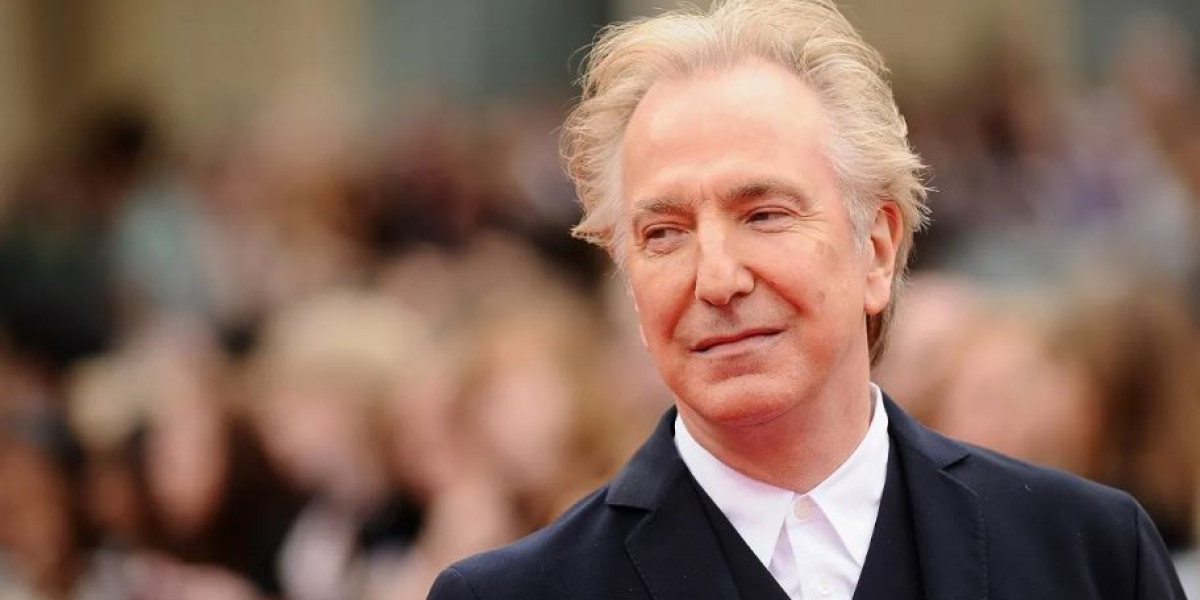Alan Rickman was one of the most versatile and acclaimed actors of his generation, who left behind a rich legacy of memorable performances in theatre, film, and television. He was also known for his distinctive deep, languid voice, his sharp wit, and his kindness and generosity towards his colleagues and fans. In this blog post, I will pay tribute to his life and career, and share some of the reasons why he was so beloved by audiences around the world.
Early Life and Education
Alan Sidney Patrick Rickman was born on 21 February 1946 in the Acton district of London, to a working-class family of Irish and Welsh descent. His father, Bernard, was a factory worker and a former Second World War aircraft fitter, who died when Alan was only eight years old. His mother, Margaret, was a housewife who raised Alan and his three siblings, David, Michael, and Sheila, on her own. Alan later said that his mother was "a bit of a hero" who instilled in him a sense of curiosity and a love of reading
Alan attended Latymer Upper School on a scholarship, where he excelled in art and drama. He then studied graphic design at Chelsea College of Art and Design, where he met Rima Horton, who would become his longtime partner. They moved in together in 1977 and married in 2012, after 40 years of living together. Alan described Rima as "the most incredible woman in the whole world" and said that they were "very, very happy"
After graduating from Chelsea College, Alan co-founded a successful graphic design business, Graphiti, with some friends. However, he felt that his true passion was acting, and decided to pursue a career on stage. He applied for a scholarship at the Royal Academy of Dramatic Art (RADA), and was accepted at the relatively late age of 26. He later said that he was "very lucky" to get into RADA, and that it was "the best thing that ever happened" to him
Theatre Career
Alan trained at RADA for two years, and then joined the Royal Shakespeare Company (RSC), where he performed in various modern and classical plays. He made his breakthrough in 1985, when he played the seductive and manipulative Vicomte de Valmont in the RSC production of Les Liaisons Dangereuses, based on the 18th-century novel by Pierre Choderlos de Laclos.
His performance was widely praised by critics and audiences, and earned him a Tony Award nomination when the play transferred to Broadway in 1987. He later said that playing Valmont was "the greatest theatrical experience of my life".
Alan also appeared in other notable theatre productions, such as Antony and Cleopatra, As You Like It, Hamlet, The Seagull, and Private Lives. He also directed several plays, such as The Winter Guest, Creditors, and My Name is Rachel Corrie. He was respected and admired by his fellow actors and directors, who praised his professionalism, intelligence, and generosity. He once said that theatre was "the ultimate test of an actor’s skill" and that he always felt "at home on stage".
Film and Television Career
Alan made his film debut in 1988, when he was cast as the charismatic and ruthless German terrorist leader Hans Gruber in Die Hard, opposite Bruce Willis. He was initially reluctant to take the role, as he did not want to be typecast as a villain, but he accepted it after being impressed by the script and the director, John McTiernan.
He created a memorable and iconic character, who became one of the most influential screen villains of all time. He later said that playing Gruber was "terrific fun" and that he was "very proud" of the film.
Alan went on to play a variety of roles in film and television, ranging from romantic heroes to comic characters to complex anti-heroes. He won the BAFTA Award for Best Actor in a Supporting Role for his role as the Sheriff of Nottingham in Robin Hood: Prince of Thieves (1991), where he stole the show with his hilarious and over-the-top performance.
He also earned critical acclaim for his roles in Truly, Madly, Deeply (1991), where he played a romantic cello-playing ghost; Sense and Sensibility (1995), where he played the noble and gentle Colonel Brandon; and Michael Collins (1996), where he played the Irish revolutionary leader Eamon de Valera.
He also showed his comedic talents in films such as Dogma (1999), where he played the sarcastic and cynical angel Metatron; Galaxy Quest (1999), where he played the frustrated and pompous actor Alexander Dane; and Love Actually (2003), where he played the unfaithful and regretful husband Harry. He also lent his voice to animated films such as The Hitchhiker’s Guide to the Galaxy (2005), where he voiced the depressed and pessimistic robot Marvin; and Alice in Wonderland (2010) and its sequel Alice Through the Looking Glass (2016), where he voiced the mysterious and wise caterpillar Absolem.
However, his most famous and beloved role was that of Severus Snape, the enigmatic and conflicted potions master, in the Harry Potter film series (2001-2011), based on the bestselling novels by J.K. Rowling. He was handpicked by Rowling for the role, and he portrayed Snape with a perfect balance of menace, sarcasm, and vulnerability. He was adored by millions of fans, especially young ones, who grew up with the character and were moved by his tragic and heroic story. He once said that playing Snape was "a gift of a role" and that he was "very fond" of the character.
Alan also starred in several television films and series, such as Romeo and Juliet (1978), where he played Tybalt; The Barchester Chronicles (1982), where he played the ambitious and scheming Obadiah Slope; Rasputin: Dark Servant of Destiny (1996), where he played the infamous and charismatic Russian mystic Grigori Rasputin, for which he won an Emmy Award, a Golden Globe Award, and a Screen Actors Guild Award; and Something the Lord Made (2004), where he played the pioneering and compassionate surgeon Alfred Blalock, for which he was nominated for another Emmy Award and Golden Globe Award.
Death and Legacy
Alan died of pancreatic cancer on 14 January 2016, at the age of 69. He had kept his illness private, and his death came as a shock and a sorrow to his family, friends, colleagues, and fans. He was mourned and celebrated by many people, who expressed their admiration and gratitude for his work and his personality.
He was described as "a brilliant actor and a wonderful man" by J.K. Rowling, "a rare and unique human being" by Emma Thompson, "one of the greatest actors of our generation" by Daniel Radcliffe, and "a magnificent talent and a generous human being" by John McTiernan.
What Are Some Of Alan Rickman Awards And Nominations?
Alan Rickman was a prolific and versatile actor who received many awards and nominations for his work in theatre, film, and television. Some of his most notable and prestigious accolades include:
A BAFTA Award for Best Actor in a Supporting Role for his role as the Sheriff of Nottingham in Robin Hood: Prince of Thieves (1991).
A Primetime Emmy Award, a Golden Globe Award, and a Screen Actors Guild Award for Best Actor in a Miniseries or Television Movie for his role as Grigori Rasputin in Rasputin: Dark Servant of Destiny (1996).
Two Tony Award nominations for Best Actor in a Play for his roles as Le Vicomte de Valmont in Les Liaisons Dangereuses (1987) and as Elyot Chase in Private Lives (2002).
A Laurence Olivier Award nomination for Best Actor for his role as Elyot Chase in Private Lives (2002).
These are just some of the many awards and nominations that Alan Rickman received or was nominated for. He was a brilliant actor and a gentleman, who will be dearly missed and fondly remembered.
Alan Rickman Movies And Tv Shows
Alan Rickman was a prolific and versatile actor who appeared in many movies and TV shows throughout his career. Some of his most notable and popular roles include:
Severus Snape, the enigmatic and conflicted potions master, in the Harry Potter film series (2001-2011), based on the bestselling novels by J.K. Rowling. He was handpicked by Rowling for the role, and he portrayed Snape with a perfect balance of menace, sarcasm, and vulnerability. He was adored by millions of fans, especially young ones, who grew up with the character and were moved by his tragic and heroic story
Hans Gruber, the charismatic and ruthless German terrorist leader, in Die Hard (1988), opposite Bruce Willis. He was initially reluctant to take the role, as he did not want to be typecast as a villain, but he accepted it after being impressed by the script and the director, John McTiernan. He created a memorable and iconic character, who became one of the most influential screen villains of all time
Colonel Brandon, the noble and gentle suitor of Marianne Dashwood, in Sense and Sensibility (1995), based on the classic novel by Jane Austen. He won the BAFTA Award for Best Actor in a Supporting Role for his role, and he also formed a close friendship with his co-star and screenwriter, Emma Thompson, who played Elinor Dashwood
Grigori Rasputin, the infamous and charismatic Russian mystic, in Rasputin: Dark Servant of Destiny (1996), a television film that dramatized his life and death. He won an Emmy Award, a Golden Globe Award, and a Screen Actors Guild Award for his performance, which captured the complexity and charisma of the controversial figure
Alexander Dane, the frustrated and pompous actor who played Dr. Lazarus, a Spock-like alien, in a Star Trek-like TV show, in Galaxy Quest (1999), a sci-fi comedy that parodied and celebrated the genre and its fandom. He showed his comedic talents and his ability to poke fun at himself, as he reluctantly joined his co-stars in a real space adventure with a group of aliens who mistook their show for reality.
These are just some of the many movies and TV shows that Alan Rickman starred in or appeared in.
Alan Rickman Books
Alan Rickman was not only a brilliant actor, but also a writer and a reader. He wrote and edited several books, such as:
Madly, Deeply: The Diaries of Alan Rickman, a collection of his personal and candid journals from 1993 to 2016, covering his life and career. The book was edited by his wife, Rima Horton, and features a foreword by his friend and co-star, Emma Thompson.
My Name is Rachel Corrie, a play based on the writings of Rachel Corrie, an American activist who was killed by an Israeli bulldozer in Gaza in 2003. Rickman co-edited the play with journalist Katharine Viner, and also directed its premiere at the Royal Court Theatre in London in 2005.
The Return of the Native, an audiobook of Thomas Hardy’s classic novel, narrated by Rickman with his distinctive and expressive voice. The audiobook was released in 1994 and received rave reviews from listeners and critics.
He also contributed to or appeared in several other books, such as:
Nelson Mandela’s Favorite African Folktales, a compilation of stories from various African cultures, selected and introduced by Nelson Mandela. Rickman narrated two of the stories, The Ring of the King and The Lion, the Hare, and the Hyena, for the audiobook version of the book.
The Butler: A Witness to History, a book by journalist Wil Haygood, based on his article about Eugene Allen, a White House butler who served eight presidents. Rickman played Ronald Reagan in the film adaptation of the book, Lee Daniels’ The Butler, and also narrated part of the audiobook version of the book.
These are some of the books that Alan Rickman wrote or was involved in. He was a talented and versatile artist.
Alan Rickman Net Worth
Alan Rickman’s net worth was estimated to be around $16 million at the time of his death in 2016. He earned most of his wealth from his successful and diverse career as an actor, director, and writer.
Controversy And Activism Of Alan Rickman
Alan Rickman was not only a brilliant actor, but also an activist who supported various causes and expressed his opinions on political and social issues. Some of the controversies and activism that he was involved in are:
He co-wrote and directed a play called My Name is Rachel Corrie, based on the writings of an American activist who was killed by an Israeli bulldozer in Gaza in 2003. The play was criticized by some as being anti-Israel and biased, and was cancelled by some theatres due to political pressure. Rickman defended the play as a tribute to a young woman who died for her beliefs, and said that he was not taking sides in the conflict, but rather trying to promote dialogue and understanding.
He was a patron of the Research Centre for the Study of Human Rights at the London School of Economics, which aims to promote academic research and public engagement on human rights issues. He also supported the Save the Children charity, which works to improve the lives of children around the world.
He was a vocal critic of the Iraq War and the War on Terror, and signed a petition in 2003 calling for the British government to stop the invasion of Iraq. He also participated in a protest march in London against the war in 2004.
He was an advocate for the arts and culture sector, and spoke out against the cuts in funding and education that affected the industry. He said that the arts were essential for the well-being and creativity of society, and that they should not be seen as a luxury or a privilege, but as a right and a necessity .
Conclusion
Alan left behind a remarkable body of work, which will continue to entertain and inspire generations of viewers. He also left behind a legacy of kindness, generosity, and humility, which will continue to touch and influence the lives of those who knew him and loved him.
He once said that he wanted to be remembered as "somebody who did his best with the talent he had". He was much more than that. He was a brilliant actor and a gentleman, who will be dearly missed and fondly remembered.





